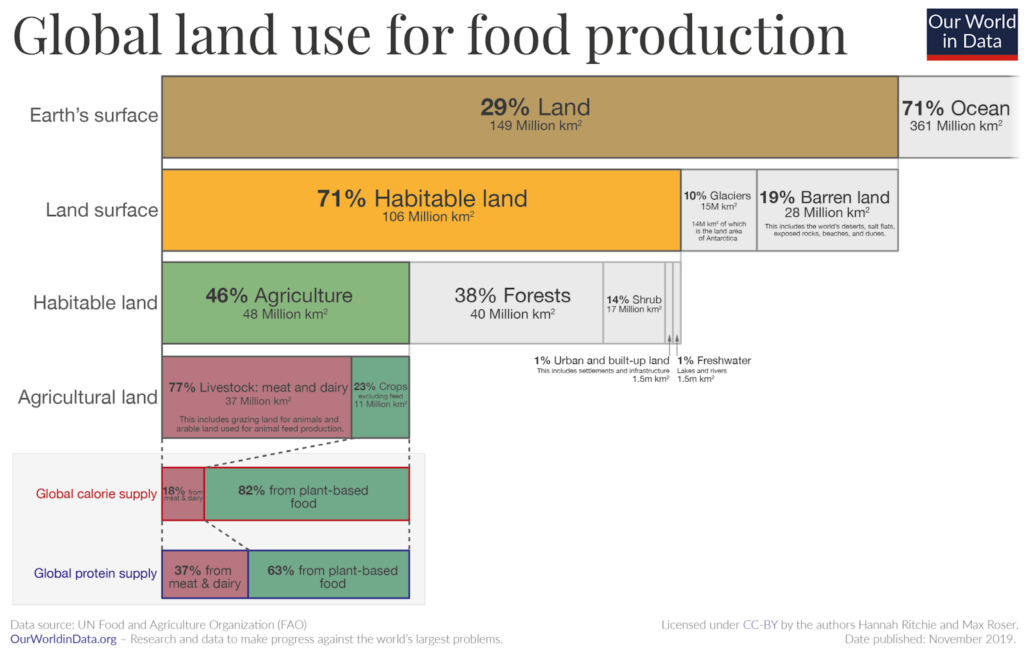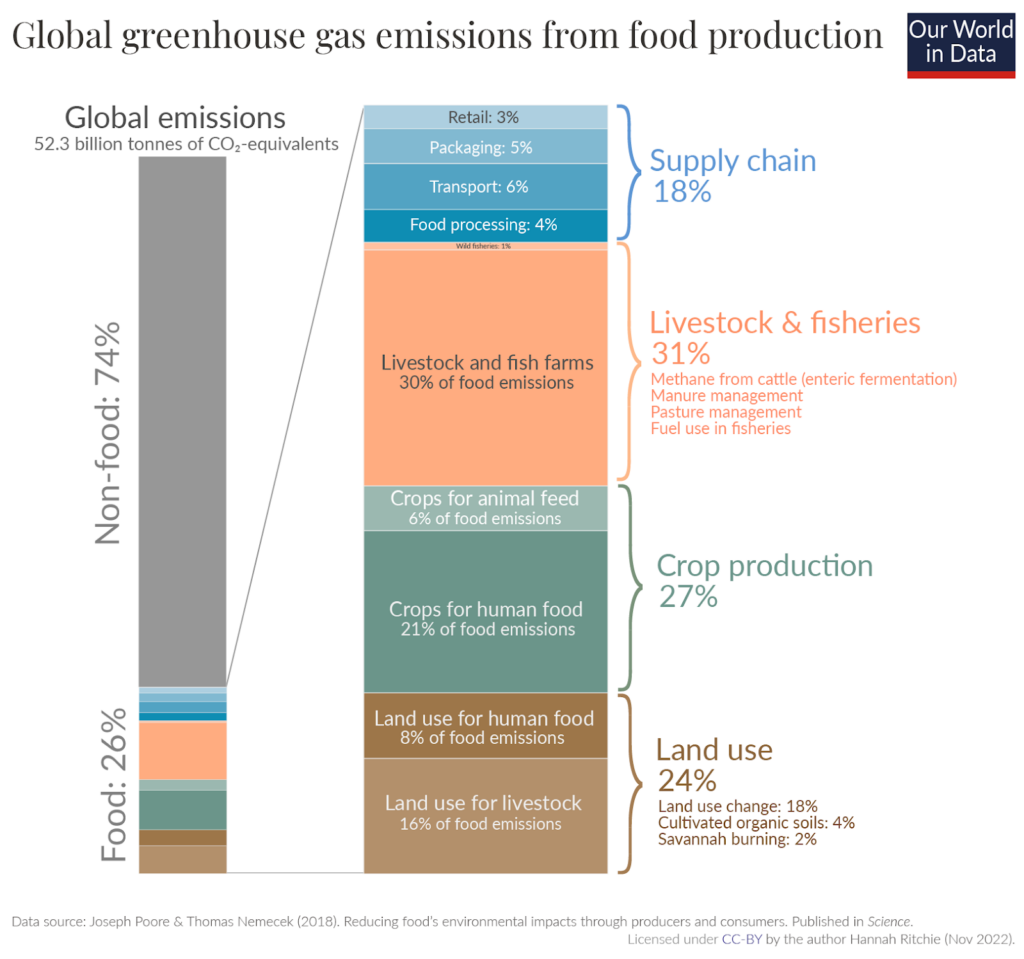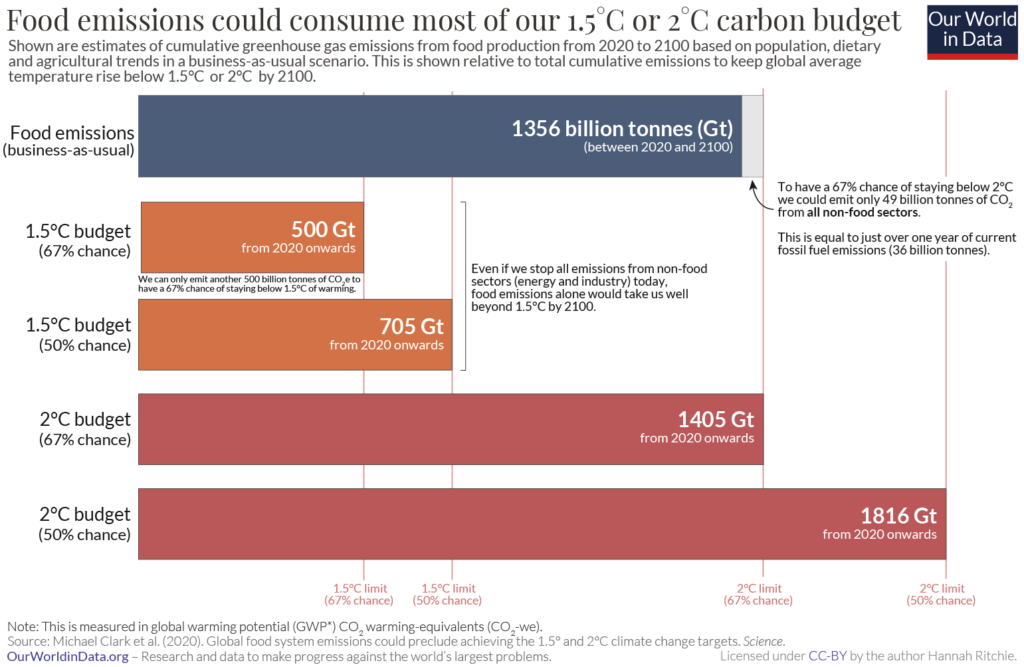Is Eating Lemons Ethical & Sustainable? Here Are the Facts
Affiliate Disclosure
Hey fellow impactful ninja ?
You may have noticed that Impactful Ninja is all about providing helpful information to make a positive impact on the world and society. And that we love to link back to where we found all the information for each of our posts.
Most of these links are informational-based for you to check out their primary sources with one click.
But some of these links are so-called "affiliate links" to products that we recommend.
Why do we add these product links?
First and foremost, because we believe that they add value to you. For example, when we wrote a post about the environmental impact of long showers, we came across an EPA recommendation to use WaterSense showerheads. So we linked to where you can find them. Or, for many of our posts, we also link to our favorite books on that topic so that you can get a much more holistic overview than one single blog post could provide.
And when there is an affiliate program for these products, we sign up for it. For example, as Amazon Associates, we earn from qualifying purchases.
What do these affiliate links mean for you?
First, and most importantly, we still only recommend products that we believe add value for you.
When you buy something through one of our affiliate links, we may earn a small commission - but at no additional costs to you.
And when you buy something through a link that is not an affiliate link, we won’t receive any commission but we’ll still be happy to have helped you.
What do these affiliate links mean for us?
When we find products that we believe add value to you and the seller has an affiliate program, we sign up for it.
When you buy something through one of our affiliate links, we may earn a small commission (at no extra costs to you).
And at this point in time, all money is reinvested in sharing the most helpful content with you. This includes all operating costs for running this site and the content creation itself.
What does this mean for me personally?
You may have noticed by the way Impactful Ninja is operated that money is not the driving factor behind it. It is a passion project of mine and I love to share helpful information with you to make a positive impact on the world and society. However, it's a project in that I invest a lot of time and also quite some money.
Eventually, my dream is to one day turn this passion project into my full-time job and provide even more helpful information. But that's still a long time to go.
Stay impactful,
Lemons are an iconic, diverse fruit, with over 40 different species existing globally. They are an excellent source of vitamin C and fiber. Furthermore, they are a staple ingredient in many drinks, baked goods, and in general-purpose cooking. However, there are many different areas during the lemon farming and production process that can be very unethical and cause harm to the environment. So, we had to ask: Is eating lemons ethical and sustainable?
Eating lemons is somewhat unethical. Their production is known to involve several abuses of workers rights, such as wage theft, low wages, and even child labor in places like Argentina. However, these practices are not as widespread as they are with some other fruits.
Eating lemons is moderately unsustainable. The lemons industry engages in some very unsustainable practices, such as monoculture farming. They also contribute to deforestation, have high pesticide usage, and require significant irrigation. However, they still have a low carbon footprint and don’t use plastic packaging.
In this article, we will assess both the ethical and sustainability practices of the lemon industry. Through these two lenses, you will be able to gain in-depth knowledge of the overall impacts of the lemons that you eat!
Here’s How We Assessed the Ethics & Sustainability of Lemons
The Sustainability Assessment of Food and Agriculture Systems (SAFA) is one of the ways we measure the externalities of our actions, like the consumption of lemons. It is a holistic assessment based on the potential impact of food and agriculture operations on the environment and people. Those impacts are changes in our environment that can have adverse effects on the air, land, water, fish, and wildlife or the inhabitants of the ecosystem.
“Ethical: The discipline concerned with what is morally good and bad and morally right and wrong”
Encyclopedia Britannica
Ethics and sustainability are closely interconnected concepts that share a common objective: the well-being and preservation of our planet, including all its life and future generations.
“Sustainable: The ability to be maintained at a certain rate or level | Avoidance of the depletion of natural resources in order to maintain an ecological balance”
Oxford Dictionary
Basically, all goods and services you buy—including lemons—leave an impact on people, animals, and our environment. And when it comes to food in general the following are key factors for their ethics and sustainability:
- Social and economic conditions: The ethics of food crucially depends on the social and economic conditions of the farmers who grow them. Especially on fair labor practices, including fair wages and safe working conditions.
- Seasonality: Eating seasonally is a lever of sustainability. The two key reasons are that seasonal food is more likely grown in their “natural growing season” without using greenhouses, and also more likely to be grown locally.
- Land requirements: Large parts of the world that were once covered by forests and wildlands are now used for agriculture. 10 million hectares of forest are destroyed annually and 50% of the world’s habitable land is now used for agriculture. This loss of natural habitat has been the main driver for reducing the world’s biodiversity.
- Water footprint: 70% of global freshwater is now used for agricultural purposes. By assessing the water footprint of a particular food, we can determine how our limited freshwater resources are being consumed and polluted.
- Pesticide and fertilizer usage: Pesticides and fertilizers provide a range of agricultural benefits. However, numerous studies link pesticides and fertilizers to serious effects on human health, along with disruptions to vital ecosystems and the spread of aquatic dead zones.
- Carbon footprint: The carbon footprint is one of the ways we measure the effects of our human-induced global climate change. Today, food production accounts for over a quarter (26%) of global greenhouse gas emissions.
- Waste generation: Food and its packaging account for almost 45% of the materials landfilled in the US alone. And packaging sent to landfills, especially when made from plastics, does not degrade quickly or, in some cases, at all.
To understand the overall environmental impact of lemons, we must assess each of their key factors. This Sustainability Assessment of Food and Agriculture Systems (SAFA) is a tool developed for assessing the impact of food and agriculture operations on the environment and people. And this tool helps us to evaluate whether eating lemons is ethical & sustainable.
Here’s How Ethical & Sustainable Eating Lemons Is
The overall ethics & sustainability of lemons is poor. They engage in both unethical practices, like low wages and wage theft, as well as unsustainable practices, like deforestation, monoculture farming, and high irrigation requirements.
Lemons have some good qualities when it comes to ethics and sustainability. For example, they don’t have significant reports of child or forced labor in the US, and they generally avoid the worst forms of packaging, such as plastic and styrofoam. However, for the most part, their practices are significantly unethical and unsustainable.
So, let’s have a look at the ethics & sustainability impact of each key factor of lemons!
| Key Assessment Factors | Ethics & Sustainability |
| Social and economic conditions of lemons | Lemons’ social and economic conditions are very poor. In the US, workers are subject to restrictive contracts and below-living wages. In some other countries like Argentina, children are exploited as workers on lemon farms. |
| Seasonality of lemons | Lemons’ seasonality is not particularly important to their growth practice. They tend to be grown similarly year-round. |
| Land requirements for lemons | Lemons’ land requirements are fairly low. However, they have been identified as participating in deforestation, desertification, and monoculture farming, which means that their land footprint is moderately high. |
| Water footprint of lemons | Lemons have a moderately high water footprint of 60 inches of water per year. Because of where they are grown, they require a high amount of irrigation. |
| Agrochemical usage for lemons | Lemons’ agrochemical usage is high. The specific agrochemicals they use, such as nitrogen fertilizer and fungicides, are particularly harmful to the environment. |
| Carbon footprint of lemons | The carbon footprint of lemons is 0.09kg (0.19lbs) CO2e per pound of lemons, which is fairly low compared to other fruits. The main contributing factors to this carbon footprint are the pesticides used in production, long transportation distances, and the lack of proper waste management. |
| Waste generation of lemons | Lemons’ waste generation is moderate. They use cardboard packaging, which is easily recycled but still has fairly low composting rates. |
These are the overall summaries, but there is a lot more to the story. In the next few sections, we will dive deeper into each stage to illustrate to you all the important aspects of lemons’ ethics & sustainability.
How Ethical & Sustainable Are the Social and Economic Conditions for Lemons
Lemons’ social and economic conditions are very poor. In the US, workers are subject to restrictive contracts and below-living wages. In some other countries like Argentina, children are exploited as workers on lemon farms.
Everything we consume was made or harvested by somebody. In past centuries, this was often someone who lived in your community and who you might have even known personally. But through the rise of globalized distribution systems, we have become increasingly alienated from the people who make our food. This leaves a lot of room for exploitation and abuse, both of which are rampant in the food industry. Here, we will look at how the lemon industry fares in relation to these ethical questions.
How ethical & sustainable are the social and economic conditions of growing lemons?
- Are farmers paid fair wages to grow lemons: In Florida, citrus pickers are paid considerably more than the minimum wage, making $11.20 per hour compared to Florida’s minimum wage of $8.10. On a 40-hour work week, this would come to around $23,000 per year. However, when you take into account Florida’s estimated living wage of around $50,000 per year, this is still considerably low. Therefore, though citrus farmers in Florida make more than the minimum wage, it is still less than half what an average person would need to make to live in Florida.
- How safe are the working conditions to grow lemons: There are several dangers associated with citrus picking. In Florida, workers are subjected to falling risks, especially from their 20-foot ladders, where they have to carry full bags weighing up to 90 lbs. They are also at risk of eye injuries and exposure to pesticides.
- Are there reports of child or forced labor to grow lemons: In a report from 2008, it was found that Argentinian lemon farms had used child labor. Child labor is technically illegal in Argentina, but this doesn’t stop some farms from using it covertly. Child labor in the citrus industry has also been reported in Turkey and Belize.
- What is the wider economic impact on the communities that grow lemons: Many lemon farm workers in Florida are working under the guest labor program, which allows people to come to the US on the condition that they work for a specific farm. These programs can help people from countries with high unemployment rates find work, but they have also been criticized for leaving workers vulnerable to exploitation.
In short, the lemon industry’s use of horrific practices like child labor (in Argentina), restrictive working conditions, and below-living wages mean that they are a very unethical fruit.
How Ethical & Sustainable Are the Seasonality for Lemons
Lemons’ seasonality is not particularly important to their growth practice. They tend to be grown similarly year-round.
Every fruit has a natural season in which they grow, usually lasting a couple of months, which can range depending on the region. However, international demand for every kind of fruit is year-round. This demand is often met by importing fruits from tropical places which can grow year-round, or by growing them in greenhouses. Both of these methods use more resources and are thus less sustainable than conventional farming. Here, we will look at how the lemon industry accommodates year-round demand.
How ethical & sustainable is it to grow lemons in-season vs out-of-season?
- When is the natural season for growing and harvesting lemons: Lemon trees don’t have seasons in the conventional sense. They are harvested roughly once every few months year-round
- How are lemons naturally grown in-season: In-season lemons are grown in much the same way as out-of-season lemons. However, there is typically a higher lemon boost in the winter.
- How are lemons grown out-of-season: Out-of-season lemons don’t have a marked difference from in-season lemons and therefore their sustainability is unaffected.
In short, seasonality does not have a major impact on the relative sustainability of lemons.
How Ethical & Sustainable Are the Land Requirements for Lemons
Lemons’ land requirements are fairly low. However, they have been identified as participating in deforestation, desertification, and monoculture farming, which means that their land footprint is moderately high.

The growth stage has a major impact on fruits’ sustainability. The amount of land used, especially in relation to its expansion, the method with which they are grown, and their effect on surrounding land and wildlife are all important factors. In this section, we will look at the ways in which lemons’ land usage affects their sustainability.
How ethical & sustainable are the land requirements for growing lemons?
- What is the land usage of lemons: Lemons yield around 30–45 tons per hectare. This is a substantially high land yield compared to other fruits. For example, strawberries only yield up to 25 tons per hectare, and watermelons only around 2–3 tons per hectare.
- Where and how are lemons grown: Lemons are grown mainly in Mexico on the global stage. Lemons also grow on trees, which are excellent at sequestering carbon, having a higher carbon storage rate than other citrus trees. Carbon storage removes carbon from the atmosphere and sequesters it in the ground. This greatly reduces their carbon footprint.
- Are lemons grown in monocultures or polycultures: Citrus fruits are generally grown in monocultures, which are very damaging to the environment. Monocultures are not only less productive agriculturally, leading to lower yields per hectare, but also very unsustainable because they reduce the diversity of plant life, resulting in less food for pollinators.
- How does the growing of lemons affect soil fertility and erosion: Citrus farms have been identified as a major driver of soil erosion. Excess soil erosion and depletion of nutrients can lead to a phenomenon known as desertification. Desertification renders vast swaths of land completely uninhabitable and unfarmable, essentially turning them into deserts.
- How does the lemons industry affect the loss of habitable land: Citrus fruits have been linked to deforestation, especially in the Amazon. Deforestation is not just bad for the specific wildlife and people who live there but can also cause chain reactions with global consequences. Lemons are the most common citrus fruit, so they bear the brunt of these issues within the citrus industry, and thus have affected the loss of habitable land considerably.
- How does the lemons industry affect wildlife and biodiversity: Monoculture farming is very bad for wildlife and biodiversity. It prevents pollinators and other wildlife from accessing proper nutrients and can negatively affect soil microbes. Therefore, the lemon industry has caused significant harm to wildlife and biodiversity.
In short, the lemon industry’s use of monoculture farming, as well as their participation in deforestation means that their agricultural practices are fairly unsustainable.
How Ethical & Sustainable Is the Water Footprint of Lemons
Lemons have a moderately high water footprint of 60 inches of water per year. Because of where they are grown, they require a high amount of irrigation.
Water usage is one of the most important factors in a fruit’s sustainability. Practices like irrigation use significant resources and can cause pollution, and as such, factors like the amount of water used, where it is sourced, as well as the way they affect the water sources around them, are all important. Here, we will look at these different angles of lemons’ water footprint.
How ethical & sustainable is the water footprint of growing lemons?
- What is the overall water usage of lemons: Mature lemon trees need about 60 inches of water per year, but young trees need twice this amount. This is slightly above average for fruits. For example, cherry trees only need 35 inches of water per year, but figs need up to 75 inches per year. This means that lemons’ overall water footprint is moderate.
- What is the green water footprint of lemons: The green water footprint is the amount of water from precipitation stored in the soil and used by plants for growth. Most US-consumed lemons are grown in Arizona, which only gets 12 inches of rain per year. Therefore, the vast majority of the rainfall is going toward lemon farming.
- What is the blue water footprint of lemons: The blue water footprint is the amount of water sourced from surface (such as rivers or lakes) or groundwater resources. Since Arizona’s annual rainfall is nowhere near enough to cover lemons’ water requirements, they need significant irrigation. As a result, their blue water footprint is very high.
- What is the gray water footprint of lemons: The gray water footprint is the amount of freshwater required to clean up water pollution to meet certain quality standards. Essentially, it’s the amount of water needed to make polluted water clean enough to be safe and healthy for humans and the environment. As well, since lemons use a significant amount of pesticides, a significant amount of water is needed to clear up their chemical waste.
- How does the lemons industry affect freshwater and ocean pollution: Lemons use lots of pesticides, which are particularly damaging to freshwater sources. The significant amount of irrigation that they use also has an impact on water sources, mainly through over-salination and harming groundwater balance. Between these two factors, lemons have a major impact on freshwater pollution.
In short, lemons’ use of extensive irrigation, as well as high pesticide usage means that they are fairly unsustainable when it comes to water usage.
How Ethical & Sustainable Is the Agrochemical Usage for Lemons
Lemons’ agrochemical usage is high. The specific agrochemicals they use, such as nitrogen fertilizer and fungicides, are particularly harmful to the environment.
Pesticides and fertilizers are agrochemicals that are very unsustainable and damaging to ecosystems. This is because they require resources to create and can easily run off into groundwater and soil systems. Here, we will look at how sustainable lemons’ pesticide and fertilizer rates really are.
How ethical & sustainable is the agrochemical usage of growing lemons?
- What is the pesticide usage of lemons: Lemons use a high amount of pesticides, as well as fungicides. Pesticides can cause many kinds of environmental damage, including poisoning surrounding wildlife, and leakages getting into soil and groundwater. Fungicides in particular are harmful to microorganisms in soil, reducing biodiversity in surrounding areas.
- What is the fertilizer usage of lemons: Lemon trees are typically fertilized with equal parts potassium, phosphorus, and nitrogen. While potassium is generally minimally invasive, phosphorus and nitrogen have been identified as very damaging to ecosystems and thus very unsustainable.
- Are there any known issues connected to the agrochemical usage for lemons: Lemons are known for using a significant amount of fungicides, which have hormone-disrupting qualities and can even cause cancer. These harmful qualities can be harmful to humans, plants, and animals alike.
In short, lemons’ use of agrochemicals like pesticides, as well as nitrogen and phosphorus fertilizers mean they are a significantly unsustainable fruit.
How Ethical & Sustainable Is the Carbon Footprint of Lemons
The carbon footprint of lemons is 0.09kg (0.19lbs) CO2e per pound of lemons, which is fairly low compared to other fruits. The main contributing factors to this carbon footprint are the pesticides used in production, long transportation distances, and the lack of proper waste management.

Carbon footprint is one aspect of the overall sustainability of a fruit. It essentially measures how much carbon or other greenhouse gasses the production of fruits emits into the atmosphere. Emissions from product manufacturing, irrigation, transportation fuel, and landfills all add up to create the overall carbon footprint of a fruit. Let’s see how the carbon footprint of lemons contributes to their overall sustainability.
How ethical & sustainable is the carbon footprint of lemons?
- What is the overall carbon footprint of lemons: The overall carbon footprint of lemons is around 0.09kg (0.19lbs) CO2e per pound of lemons. This means that for every pound of lemons produced, 0.09kg of carbon is released into the atmosphere. This is an extremely low carbon footprint compared to other fruits.
- What are the main contributors to the carbon footprint of lemons: The main factors that contribute to the carbon footprint of lemons are transportation distances, low composting rates, and high pesticide usage.
- Which life-cycle stage of lemons has the highest carbon footprint: The life cycle stage that contributes the most to lemons’ carbon footprint is transportation. This is because lemons have to be shipped to the US from Chile and Argentina. They also need to be refrigerated during transportation which raises their carbon footprint further.
In short, despite the fact that lemons engage in some high-emitting practices like pesticides and long transportation distances, they still have a very low carbon footprint, meaning they are fairly sustainable in this category.
How Ethical & Sustainable Is the Waste Generation of Lemons
Lemons’ waste generation is moderate. They use cardboard packaging, which is easily recycled but still has fairly low composting rates.
When fruit waste, either in the form of packaging or organic materials, is disposed of, it can cause a lot of problems. Whether it’s damaging wildlife, getting into oceans, emitting methane, or dissolving into microplastics that contaminate groundwater, all these materials have their part to play. The sheer amount of waste we produce is reaching a crisis point and won’t be able to continue much longer. In this section, we will look at how sustainable lemons’ waste generation is.
How ethical & sustainable is the waste generation of lemons?
- What is the packaging of lemons: Lemons are typically packaged in cardboard boxes. Cardboard has a moderate environmental impact but still contributes heavily to deforestation. Deforestation is very unsustainable, as it destroys habitats and removes crucial biodiversity.
- How is the packaging of lemons disposed of: Cardboard, fortunately, has a very high recycling rate of around 89%. This means that a relatively small amount of cardboard from lemons is ending up in landfills, which is good for their sustainability.
- How are lemons disposed of: Lemon peels are biodegradable. However, they often end up in landfills, since roughly only 4% of food waste is composed. Besides the general environmental damage that landfills can cause, food waste in landfills releases methane, a harmful greenhouse gas.
In short, because lemons use less harmful packaging (cardboard) than other fruits, but still have low composting rates, their waste is moderately unsustainable.
What Have Been Historical Ethics & Sustainability Issues Connected to the Lemons Industry
The lemon industry has historically participated in some unethical actions, such as wage theft, as well as some unsustainable actions, such as deforestation and harm to wildlife.
All fruits have had a complex road toward global distribution. They originate in one part of the world and often travel far to end up in your local supermarket. From farm to table, some of our favorite fruits have used unsustainable practices. Whether it’s exploiting labor, deforestation to meet demand, water pollution, or disruption of wildlife, most fruits have left a path of destruction. Many of these effects are still felt today or have even increased. Let’s see how lemons have fared throughout history.
What have been the key ethical & sustainable issues of the lemons industry?
- Has labor been exploited because of lemons production: The citrus industry has a long history of exploiting workers, especially for wages. One case involved a group of 100 citrus workers banding together to sue their employer over $250,000 worth of unpaid wages. In this case and more, we can see that there have been some very unethical actions from the citrus industry.
- How much land has been lost because of lemon production: Lemon production has been linked to some major deforestation cases. One in particular, concerns an Argentinian farm that has been infringing on national park land, sometimes illegally. Cases like this show how dangerous and unsustainable large-scale lemon farming can be.
- Which wildlife species have been negatively impacted or displaced because of lemon production: Deforestation cases like the Argentinian national park incidences, have major impacts on wildlife. Deforestation causes habitat loss, which is the leading cause of wildlife population decline, contributing heavily to endangerment and extinction. Because of their involvement in deforestation cases, lemon agriculture has contributed to species population decline, especially in South America.
- Have water sources and soil been contaminated because of lemon production: Nitrogen and phosphorus fertilizers have both been linked to invasive algae growth, which is particularly harmful to waterways and aquatic life. Their continued use of these fertilizers means that their impact on waterways has historically been very unsustainable.
In short, the lemon industry has historically been involved with both unethical practices, such as withholding wages, as well as unsustainable practices, like destroying national parks.
How Can You Reduce Your Environmental Impact and Offset Your Personal Carbon Footprint
There are a few things you can do to make your lemon consumption more ethical and sustainable, while still enjoying them. You can also consider offsetting your personal and lemon-related carbon emissions, which work to remove carbon emissions elsewhere that are then attributed to you. Here, we will walk you through how to accomplish both of these things.
How Can You Shop for Lemons More Ethically & Sustainably
In this section, we give you a short list of ways you can consume lemons in a more sustainable way. This list is designed to target the most unsustainable parts of lemons’ life-cycle:
- Buy US-grown lemons: Although there have been some instances of worker exploitation in the US lemon industry, there haven’t been significant reports of child labor, such as in Argentina. Therefore, if you buy lemons from within the US, there is a potentially lower risk that they have involved child labor practices. Plus, smaller transport times means a lower carbon footprint and thus a more sustainable life cycle.
- Purchase organic lemons: Pesticide and fertilizer usage is a major issue in lemon farming. Organic farms generally avoid high amounts of chemical pesticides and nitrogen fertilizers and so they are good to support if you want to reduce your pesticide and fertilizer impact. Making the effort to buy organic lemons can greatly lessen your lemons’ impact on waterways and soil, making them more sustainable. Additionally, workers on organic farms are exposed to fewer chemicals, meaning that chemical poisoning is one less safety concern to worry about.
- Compost and recycle: One of the most unsustainable aspects of lemons is their contribution to landfills. So, by making sure you compost all lemon peels and recycle any cardboard packaging, you can reduce the impact of cardboard and organic waste in lemons’ life cycle.
Following some of these methods can really help you to make your lemon-eating more sustainable. None of these will completely eradicate the negative impacts, since there are always effects that may be outside of your control. But some reduction is always better than nothing!
Which Organizations Can You Support to Help Promote Ethics & Sustainability
While lemon production engages in some very unsustainable practices, there are also some organizations that help you change the parts of these processes that would otherwise be outside of your control. These organizations are working hard to prevent and reverse damage to the environment caused by industries like lemon agriculture, towards a more sustainable future.
In the table below are some of the best charities that work in the areas where lemon production are very unsustainable—and beyond:
Though it is helpful to boost the sustainability of your personal lemon consumption, supporting these organizations takes your positive impact a step further. You will be reaching far beyond your own consumption impacts and helping to build a better world for everyone!
How Can You Offset Your Personal Carbon Footprint
The carbon footprint is a key part of how sustainable we live. And it is one of the ways we measure the effects of our human-induced global climate change. Yes, even from eating lemons!
“Carbon footprint: the amount of greenhouse gasses and specifically carbon dioxide emitted by something (such as a person’s activities or a product’s manufacture and transport) during a given period”
Merriam Webster
Basically, it is the amount of carbon emitted by you as an individual or an organization providing you with goods and services – including lemons:
- This includes GHG emissions from producing the products that we use and foods that we eat (e.g., power plants, factories or farms, and landfills)
- GHG emissions from fuel that we burn directly or indirectly (e.g., logistics and transportation, cooling or heating facilities),
- as well as the GHG emissions attributed to how we consume these products and foods.

Carbon offsets are reductions in carbon emissions that are used to compensate for carbon emissions occurring elsewhere – for example for the carbon emissions that are associated with lemons. They are measured in tons of CO2 equivalents and are bought and sold through international brokers, online retailers, and trading platforms on what is known as the global carbon offset market.
“Carbon Offset: a way for a company or person to reduce the level of carbon dioxide for which they are responsible by paying money to a company that works to reduce the total amount produced in the world, for example by planting trees”
Oxford Dictionary
In terms of lemons – and indeed all food types – there will always be a carbon footprint, because of the resources it takes to get your food from farms to the place where you’ll eventually eat them. And while there are ways to reduce your carbon footprint when shopping for lemons, carbon offsets would be a way to reduce your CO2e emissions all the way down to net zero (or even to become climate positive).
However, when you purchase carbon offsets, it’s important that they actually make a difference in offsetting (aka reducing) total carbon emissions. To achieve that, the following are key criteria:
- Carbon offset projects have to be effective (different projects have different effectiveness rates)
- Carbon offset projects have to be additional
- Carbon offset projects have to be permanent
- The claims from carbon offset projects have to be verifiable
To find the best carbon offsets for you personally, check out our full guide on the best carbon offsets for individuals, where you’ll also learn more about how these carbon offset projects work, what their respective offsetting costs are, and what your best way would be to offset your own carbon emissions.
Final Thoughts
The lemon industry has committed some very serious crimes when it comes to people and the environment. It has engaged in labor exploitation, deforestation, harmful pesticide usage, monoculture farming, and many other unsustainable and unethical practices. However, they are not the worst of fruits. On top of that, there are many things you can do to help make your lemon consumption more sustainable. You can support organic lemon farms, dispose of waste properly, and even support charities that tackle some of the larger issues. Try these things, and you can make your lemon consumption more ethical and sustainable!
Stay impactful,

Sources
- Feast and Field: The Lowly Lemon
- Healthline: Lemons
- Yummly: Fresh Lemon Drinks
- Taste of Home: Best Lemon Desserts
- Recipe Tips: All About Lemons
- Food and Agriculture Organization of the United Nations: SAFA (Sustainability Assessment of Food and Agriculture systems) Guidelines
- Food Ethics Council: What is food ethics?
- The Fair Labor Association: Agriculture Standards
- MDPI Sustainability: Eating in Season—A Lever of Sustainability? An Interview Study on the Social Perception of Seasonal Consumption
- MDPI Foods: The Role of Local Seasonal Foods in Enhancing Sustainable Food Consumption: A Systematic Literature Review
- UN Environment Programme: Environmental Impact Assessment and Strategic Environmental Assessment: Towards an Integrated Approach
- Our World in Data: The environmental impacts of food and agriculture
- Our World in Data: Global land use for food production
- World Health Organization: Preventing disease through healthy environments: a global assessment of the burden of disease from environmental risks
- ScienceDirect (Biological Conservation): Worldwide decline of the entomofauna: A review of its drivers
- EPA: The Sources and Solutions: Agriculture
- EPA: Reducing Food Waste and Packaging
- FoodPrint: The Environmental Impact of Food Packaging
- CREC: The Status of Citrus Labor
- SOFI: Cost of Living in Florida
- NCBI: Preventing Eye Injuries Among CItrus Harvesters
- Ref World: 2008 Findings on the Worst Forms of Child Labor
- Verite: Citrus
- CREC: Guest Workers
- WOL: Do Guest Worker Programs Give Firms Too Much Power?
- Minneton, KA Orchards: The Right Time to Pick Lemons
- Our World in Data: Greenhouse Gas Emissions per 1,000 kilocalories
- Peppers Home Garden: How Much Water Do Lemon Trees Need
- Impactful Ninja: What is the Carbon Footprint of Lemons
- Nepad: Citrus Fruit Yields
- Impactful Ninja: What is the Carbon Footprint of Strawberries
- Impactful Ninja: What is the Carbon Footprint of Watermelons
- Frutas Hortalizas: Lemon Production
- Pennington: How to Grow and Care for an Indoor Lemon Tree
- Ailimpo: Carbon Footprint of the Lemon Sector in Spain
- Green Matters: How Do Carbon Emissions Affect the Environment
- The Independent: Avocados, Coffee, and Citrus Fruits Threaten Global Food Security
- Clemson: Replant Site Considerations
- Food Tank: Monoculture Could Worsen Vulnerability to Climate Change
- Science Direct: A Systematic Review of Soil Erosion in Citrus Orchards
- Iberdrola: What is desertification?
- WWF: 10 Products and Ingredients that Come From Tropical Rainforests
- PachaMama: Effects of Deforestation
- Gallant Intl: Environmental Impacts of Monoculture
- Impactful Ninja: What is the Carbon Footprint of Cherries
- Impactful Ninja: What is the Carbon Footprint of Figs
- Water Footprint Network: What Is a Water Footprint?
- AZ Climate: Average Annual Precipitation Arizona
- PubMed: Pesticide Residue Survey in Citrus Fruits
- Science Direct: Impact of Pesticides on Freshwater
- FAO: Environmental Consideration in Irrigation Development
- EWG: Hormone-Disrupting Fungicide Found in Citrus
- Friends of the Earth: Effects of Pesticides on Wildlife
- USGS: Pesticides in Groundwater
- NCBI: Effects of Fungicide on Soil Microbes
- BacFertilizers: Lemon Tree Fertilizer
- Direct Farm: Potassium
- EPA: Phosphorus
- Mitsui: Reducing the Environmental Impact of Chemical Fertilizers
- The Packer: Lemon Consumption Increases
- EPA: Reducing the Impact of Wasted Food
- TIS: Lemons Transport
- University of California: Lemon Orchard Startup Cost
- TRVST: Environmental Impact of Cardboard
- Also Known As: 12 Interesting Facts About Packaging Waste
- Colorado: Hidden Damage of Landfills
- GOV.BC: Waste Management
- Greenpeace: La Moraleja
- National Geographic: Endangered Species
- EPA: The Issue With Nitrogen Fertilizers
- UVM: Sources of Nitrogen for Organic Farmers
- Plated Cravings: Moist Lemon Cake Recipe
- Food and Wine: Honey Lemon Dressing
- Wonky Wonderful: Natural Lemon Vinegar Cleaner
- Hearts Content Farmhouse: Lemon Soap Recipe
- SN Applied Sciences Journal: Worldwide pesticide usage and its impacts on ecosystem
- United States Environmental Protection Agency (EPA): Climate Change Terms
- Impactful Ninja: Best Charities That Advance Ethics Worldwide
- Impactful Ninja: Best Charities That Promote Sustainability
- Impactful Ninja: Best Charities That Help Farmers
- Impactful Ninja: Best Charities That Fight to Protect our Environment
- Impactful Ninja: Best Charities for Reforestation
- Impactful Ninja: Best Wildlife Conservation Charities
- Impactful Ninja: Best Charities for Protecting the Amazon Rainforest
- Impactful Ninja: Best Charities That Fight for Clean Water
- Impactful Ninja: Best Charities That Help Conserve Our Rivers
- Impactful Ninja: Best Charities to Save Our Oceans
- Impactful Ninja: Best Charities for Helping Farm Animals
- Impactful Ninja: Best Charities for Climate Change
- Impactful Ninja: Best Carbon Offsets for Individuals
- Impactful Ninja: Best Charities That Fight to Reduce Food Waste
- Impactful Ninja: Best Charities That Fight to End Plastic Pollution
- Impactful Ninja: Best Charities That Promote Recycling
- Impactful Ninja: Why Is a Carbon Footprint Bad for the Environment?
- Impactful Ninja: Best Carbon Offsets for Individuals




